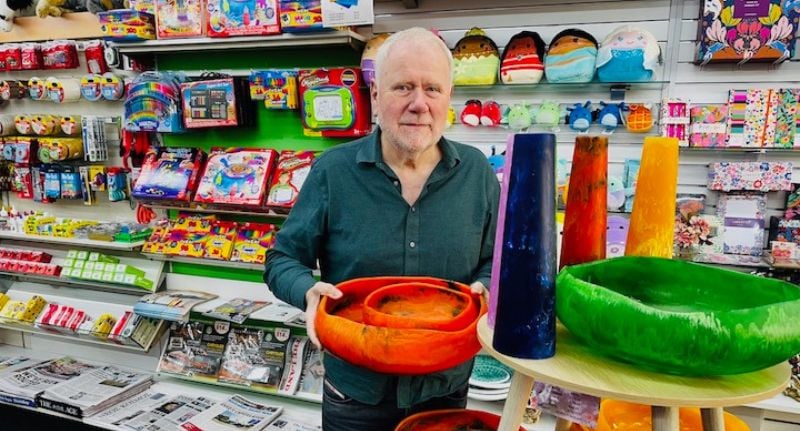Fifteen years ago, Mark Fletcher predicted that magazine publishing in Australia would face such a steep and sustained decline that newsagents would need to diversify quickly or risk shutting down altogether.
Fletcher, who is the CEO of newsagency marketing group NewsXpress and has been at the coal face of what he describes as print’s “slow and steady decline”, was anything but surprised when Are Media officially went up for sale last week.
With prospective buyers now kicking the tires on Are Media, Mediaweek took the opportunity to consider the health of the local magazine industry. Along with Fletcher, Mediaweek also spoke with Bench Media Head of Strategy Nate Vella and the vocal Jackie Frank, founding editor of marie claire Australia.
Unit sales continue downward trend
According to Fletcher, overall magazine sales in newsagents have dropped significantly in 2025.
“What we’re seeing so far in 2025 is that we’re sitting at around a 10% unit sale decline across the board. A lot of that decline is occurring in high-volume weeklies and monthlies.”
While many mass-market titles are losing ground, he says niche and puzzle magazines are proving more resilient.
“Special interest titles, such as Victorian Railroad Lines or Model Railway, are selling well… crossword year-on-year decline is sitting at around 2% or 3%.”

NewsXpress CEO Mark Fletcher
TikTok and portfolio overlap among key pressures
Fletcher sees digital platforms, particularly TikTok, as a major challenge to general-interest and entertainment-led print brands.
“Because Are Media is producing mass titles, they’re facing the challenge because that’s where you’ve got the biggest competition from TikTok and elsewhere.”
He also highlights a misalignment between Are Media’s focus and the categories showing the most growth:
“Special interest titles generally account for 20 to 25% of all magazines sold… women’s weeklies… account for about 8% now. 20 years ago, they would have accounted for easily 35 to 40%.”
He argues Are’s current magazine portfolio is too crowded: “Part of the challenge for the portfolio is how do they rationalise the portfolio rather than creating so much content that’s similar across different mastheads?”
“Right now, in terms of weeklies, you’ve got New Idea, Woman’s Day and Who, and for our marketplace, that’s probably at least one too many titles.”
Format stability and retail strategy shifts
Fletcher contrasts the volatility of lifestyle magazines with the reliability of formats like puzzles and established brands.
“You’ve got a tentpole product like Women’s Weekly, which is fantastic… but it’s so much cover-dependent.”
Meanwhile, puzzle publications attract steady buyers: “If people enjoy doing crosswords daily, they’ll likely continue… They can use their backpack, handbag, or whatever, and just do it whenever they’re on the train, tram, or road.”
Newsagents are adapting by shifting store layouts and diversifying offerings.
“Previously, a typical news agency would have prime real estate taken up by magazines and newspapers. Now that prime real estate is for gifts and homewares.”
“Magazine customers are still satisfied, and the news agency can diversify… Intelligent news agents have adapted their businesses… less competent news agents have ended up closing as a result.”
Advertisers shifting focus to measurable, multi-channel campaigns
Nate Vella, Head of Strategy at Bench Media, says Are Media’s second sale in five years, following its 2020 acquisition by Mercury Capital from Bauer Media, reflects deeper market instability.
“The sale of Are Media… signals continued instability for traditional publishers as both advertisers and consumers shift their focus towards digital channels.”
Future strategy will likely be driven by profit.
“Title consolidation and shrinking editorial teams” are expected, Vella notes, unless the buyer takes a more holistic view.
While magazine brands still carry weight with advertisers, print is no longer a go-to channel.
“‘Hunger’ may be too strong a word – but there is still respect for the trust, tone, and tightly targeted audiences that magazine environments offer. That said, print is no longer a default line item on the media plan.”
He says brands are instead redirecting spend into influencer marketing, drawn by its ability to provide trackable return on investment.
“We’re also seeing magazine dollars start to leak into influencer marketing… both rely on authority and trust. The added advantage of influencer is measurability.”
Vella notes that advertisers want integrated campaigns with consistent messaging across touchpoints, but publishers often fail to deliver.
“This often results in under-resourced teams, blunt bundled offerings, and incentives that prioritise volume over strategic fit – selling for selling’s sake.”

Nate Vella, Head of Strategy at Bench Media
Digital survival depends on reinvention
Asked whether legacy titles can transition to digital, Vella says survival is possible, but only with innovation.
“Short answer: yes, but only if it reinvents, not just repackages print content for the web.”
He cites Mamamia, CHOICE, and Junkee as examples of strong digital models, and contrasts them with Dolly and Cleo, which failed to adapt.
Vella argues that investment in digital versions should be driven by real engagement data.
“If the brand has successfully migrated its audience online and engagement is high, then yes, investing in the digital version makes sense… But if the print audience hasn’t followed… advertisers may be better off finding alternative ways to reach them.”
“Brand equity alone doesn’t guarantee digital success. Advertisers need to lead with what they know about their audience, not assumptions based on editorial legacy.”
A question of brand purpose, not format
Jackie Frank, founding editor of marie claire Australia, says the future of magazine brands won’t be determined by whether they appear in print, digital, or events, but whether they stand for something meaningful.
“They have to stand for something. They have to resonate. They have to be meaningful, and they have to be current… It’s just about having that emotional engagement with a customer.”
She stresses the importance of viewing brands holistically, rather than dividing print from digital.
“It’s not about dissecting, picking off mags versus online presence, social, et cetera, et cetera. I think it’s about looking at a brand in its totality.”
Frank believes the right buyer could reposition the business for success if they see the opportunity beyond traditional publishing.
“This sale was always going to happen. It was just a matter of when this was going to happen.”
“Someone with money who’s smart, who understands publishing and publishing being content as opposed to publishing something, print on ink on paper… can pick the eyes out of the best brands that work. And I feel that they’ll have a fabulous business.”
While print still plays a role, particularly for prestige advertisers, Frank says the value is in building brand ecosystems across multiple touchpoints.
“Good marketers will know it’s really important to have multiple touch points and engage ways to engage their audiences. And I think that magazine people are really savvy at doing that because we’ve always had to do that.”
She adds that those skills are transferable beyond publishing.
“I use the magazine… knowledge and training for brands. Because we, the magazine people, have had to learn how to engage.”

Jackie Frank, founding editor of marie claire Australia
What comes next
As Are Media’s ownership changes hands, the business will face pressure from two sides: a fragmented retail market and increasing demands for accountability and innovation in content delivery.
Fletcher hopes the next chapter for the company is led by someone who values the role of print while embracing what comes next.
“All we would hope is that Mercury finds a buyer who understands and respects print media and helps it have a soft landing, which it’s coming in for, like newspapers are too.”
For both retailers and advertisers, the challenge, and the opportunity, lies in marrying brand legacy with changing consumer behaviour, clearer audience propositions, and modern media strategy.
